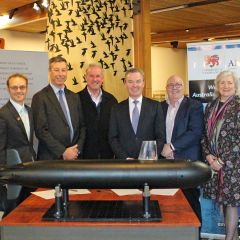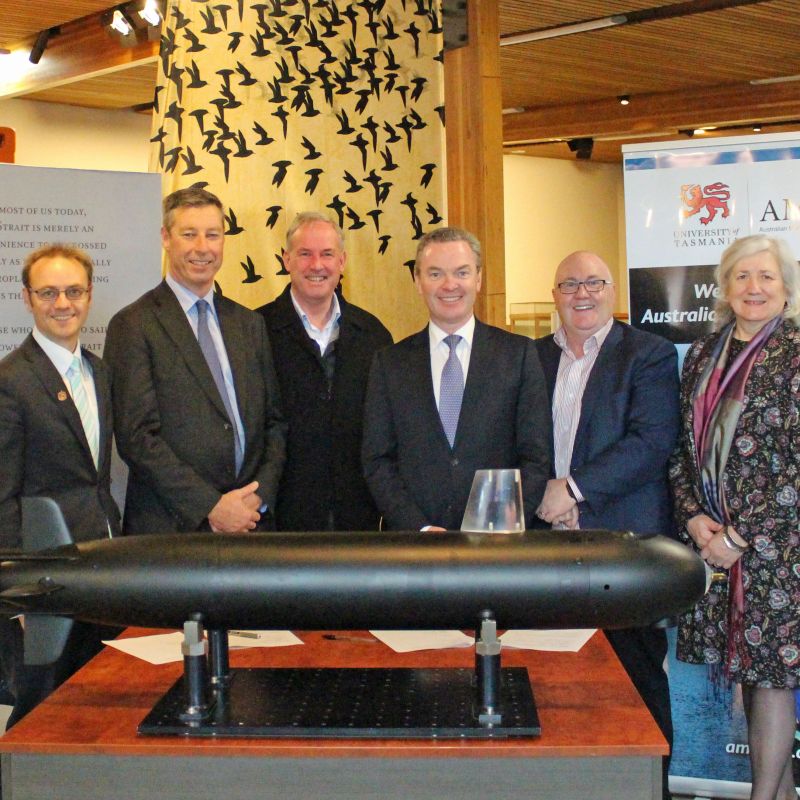The Australian Maritime College has partnered with international defence giant Thales to investigate establishing a trials and test facility for naval sonar systems in Tasmania.
Thales Australia, AMC and AMOG Consulting today signed an agreement to co-develop a facility which can utilise northern Tasmania’s deepwater lakes to test the next generation of Australian submarine and surface ship sonar systems.
Thales Australia CEO Chris Jenkins said the initiative was part of the organisation’s commitment to work collaboratively with leading Australian SMEs and universities to deliver high technology, leading-edge solutions for Defence.
“Historically, Thales has worked with AMC and AMOG Consulting on a number of sonar trials activities, and with the Australian Government’s historic recapitalisation of the Royal Australian Navy, now is the time to investigate establishing a permanent facility,” he said.
“From 1990 to 2000 Thales and AMC tested and calibrated the in-service array for Australia’s Collins Class submarines in Tasmania’s deep mountain lakes as they provide an ideal environment for sonar systems.”
ARC Research Training Centre for Naval Design and Manufacturing Director Jonathan Binns welcomed the opportunity to further AMC and the University of Tasmania’s strategic alliance with Thales Australia.
“Thales is a founding member of the research training centre and this new agreement will build upon our work in understanding the hydroacoustics and hydrodynamics of sonar systems – how noise travels through water and how water moves around an object such as a submarine hull or ship’s propeller,” Associate Professor Binns said.
This collaboration with Thales will allow us to undertake cutting-edge research that will ultimately feed into the design, manufacturing and sustainment of Australia’s next generation of naval vessels.
"Co-investment in infrastructure such as this project connects to University plans to grow its contribution to defence through focused investment in capabilities and scale across its network with a Defence Innovation and Design Precinct as its cornerstone.”
AMC Associate Professor Michael Woodward said the college had a strong reputation for partnering with industry to provide innovative research solutions in a maritime context.
“AMC has a critical mass of technical expertise and physical research facilities in hydrodynamic experimentation, while Tasmania is blessed with deep and isolated lakes that are ideally suited for a scale of testing that is yet to be explored globally,” Associate Professor Woodward said.
Bringing both of these together presents a unique opportunity to develop a new and novel experimental testing capability, with the potential to attract further investment and industry collaborations to build Australia’s naval research and development capabilities.”
University of Tasmania Deputy Vice Chancellor (Research) Professor Brigid Heywood commented on the significance of this development in expanding the strong relationships with Thales and AMOG which have contributed to a number of projects linked to the technical design of submarines and their development.
“This new investment is an exciting new chapter in the Tasmanian Defence story. The proposed new facilities will bring industry, government and universities together in a strong collaborative R & D relationship to advance Australia’s unique hydrodynamic testing facilities and provide leadership in a global context,” Professor Heywood said.
“The University’s Defence Network was designed to foster collaborative models of working which bring SMEs and major defence contractors together with government and the University’s defence research capability to advance the $90 billion national ship building program. This new initiative exemplifies the approach and strengthens key alliances, as well as showcasing the unique facilities of the Australian Maritime College.”
(Photo): Ben Clark (AMOG Consulting), Gary Dawson (Thales Australia), Liberal Senator Richard Colbeck, The Hon Christopher Pyne MP, Brett Whiteley (Liberal candidate for Braddon, University of Tasmania Deputy Vice-Chancellor (Research) Professor Brigid Heywood.
Published on: 17 Jul 2018

